E. Ballon writes to the E. M. Marble, the Acting Commissioner of Indian Affairs that he was informed of the decision to enroll Arapaho students at Carlisle. He notes that Black Coal was excited at this response and immediately went to gather pupils to send to Carlisle in order to send them by February 1st. Ballon further requests the…
National Archives and Records Administration
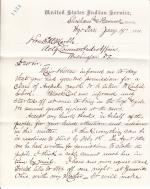
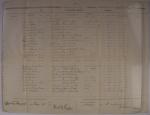
These materials include a cover letter and a Descriptive Statement of Pupils regarding 25 children transferred to the Carlisle Indian School from the Tullahassee Mission in Muscogee Indian Territory.
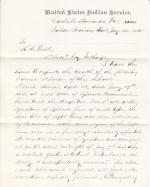
Carlisle Indian School physician, C. H. Hepburn, reports on the death of Dennis Strikes First due to typhoid pneumonia on January 19, 1881.
Note: In this record the student is identified as Denis.
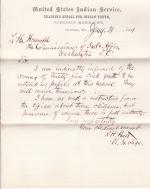
Captain Pratt writes to inform the Commissioner of Indian Affairs that he has just received notice that 25 Creek students are arriving at the Carlisle Indian School on January 22.
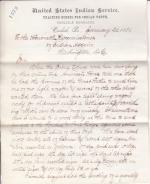
Richard Henry Pratt notes that when he spoke to American Horse and other Sioux Chiefs in 1880 as they returned home they were promised a light wagon produced at Carlisle. According to Pratt sending the wagons along with some tinware would be a good method to show the work being done by the students of the Rosebud and Pine Ridge Agency as well…
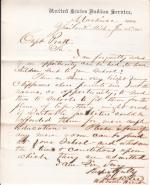
Richard Henry Pratt forwards a letter from George W. Lee, the Indian Agent at the Mackinac Agency, asking if it is possible to enroll some Chippewa students at Carlisle. If so, he would also like to know the terms and conditions of admission. Pratt notes that the Chippewa are one of the few Nations east of the Rocky Mountains that are not…
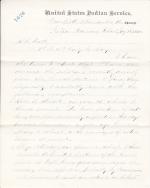
Richard Henry Pratt forwards a report on the health of the newly arrived Creek students from the school physician C. H. Hepburn. Hepburn indicates four students who have been physically affected by previous illness and comments on the age of the children as compared to the age they provided (noting he believes several of the girls are older…
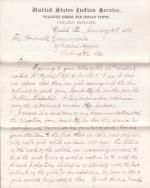
Richard Henry Pratt objects to the gender imbalance among two incoming student groups from L. J. Miles and from the Northern Arapaho. He notes that the work details of the school are divided among the sexes and depends on an equal number of girls and boys to be fair. The current makeup of the incoming students would further imbalance the…
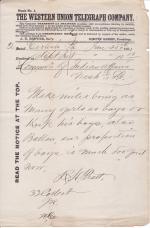
Richard Henry Pratt requests from the Commissioner of Indian Affairs that both L. J. Miles and E. Ballon should bring as many girls as boys to Carlisle otherwise they should not come. He notes that there are at present proportionately too many male students at Carlisle.
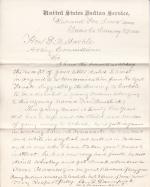
George L. Davenport, the Indian Agent at the Sac and Fox Agency in Tama, Iowa, notes that ex-Agent Trask's recommendation to enroll Jim Poweshiek at Carlisle is inadvisable. Davenport notes that Jim is 26 years old with a wife and child and can write in English and has no intention of going away to school. He further states that he would like…
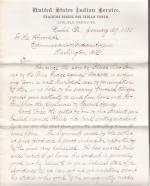
Richard Henry Pratt recommends returning two students from the Sioux Nation. The first is Lawrence due to ill health and the second is Philip Good Voice due to a request from his father and his current home sickness which may lead to poor health in the future.
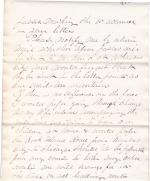
L. J. Miles, the Indian Agent at the Osage Agency, requests that if convenient when he accompanies Cheyenne children to Carlisle that the leave from Arkansas City and go through Chicago.
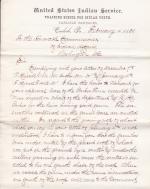
Richard Henry Pratt forwards a the lease and contract for the Parker Farm. The lease and contract stipulate how the government will farm under the lease.
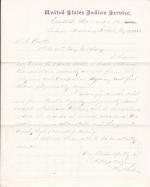
Richard Henry Pratt forwards a report from the Carlisle School physician C. H. Hepburn on the health of students recently arrived from the Cheyenne, Arapaho, and Pueblo Nations to the Commissioner of Indian Affairs.
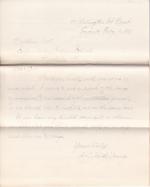
Richard Henry Pratt forwards a copy of a letter from Archibald Young - writing from Toronto, Canada - who is seeking information on the Carlisle Indian School as he is thinking of instituting a school on a similar basis. Pratt asks the Commissioner of Indian Affairs to send the last Annual Report and he will write further on the subject.
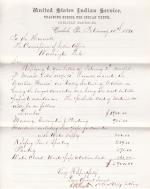
Richard Henry Pratt notes that the Carlisle Herald and Valley Sentinel of Carlisle have the two largest circulations of the local papers and would be the best to advertise for material costs. He provides estimates for lumber; masonry excavation of plastering; hardware; roofing tin and spouting; painting; and a water closet, waste pipe, and…
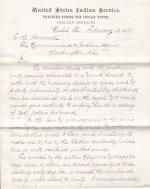
Richard Henry Pratt requests the authority to hire an office clerk at forty dollars a month. This is in addition to a request to hire a teacher at forty-five dollars a month due to the arrival of sixteen Cheyenne and Arapaho students who attend school at night after their days are spent working in their trades.
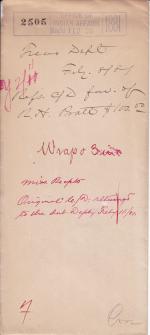
Envelope wrap detailing three miscellaneous receipts from Richard H. Pratt.
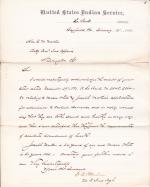
U.S. Indian Agent for the La Pointe Agency, S. E. Mahan, writes that both Joseph Martin and Moses White are healthy and would meet the requirements for admission to the Carlisle School.
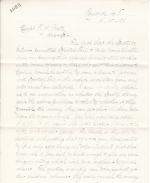
W. J. Cleveland writes to Richard Henry Pratt seeking clarification on the government's policy in regards to sending children home prior to their term of enrollment ending. Cleveland writes that since Spotted Tail was given permission to pay the expenses in returning his children home others have inquired if they are also able to do so. Pratt…
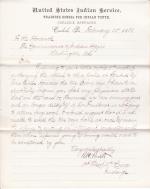
Richard Henry Pratt notes that there is an immediate need to return home Lawrence due to a decline in his health. If their proposed escort cannot leave soon then Pratt advises having a conductor accompany Lawrence and Philip Good Voice. However, he needs authority to pay the expense.
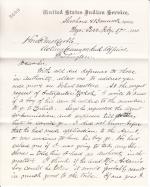
E. Ballon writes to add additional students to the party to be sent to Carlisle. He writes that an interpreter would like to send his son along with another from the Shoshone Nation and had previously received permission from the Indian Agent. In addition, one father will only send his daughter if her brother accompanies her to Carlisle.
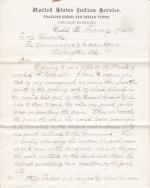
Richard Henry Pratt replies to an Office of Indian Affairs letter regarding the arrangement between the Carlisle Indian School and Richard Parker regarding the Parker Farm. Pratt states the share of the crop to be obtained by the Government this year.
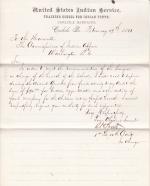
Richard Henry Pratt seeks additional funding to purchase food to meet the requirements outlined by the school surgeon for ill children, including butter, milk, and eggs.
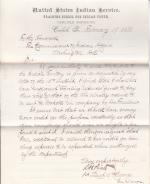
Richard Henry Pratt seeks an additional $300 for returning students to their homes in Indian Territory. He notes that fulfilling the obligations already authorized by the Commissioner of Indian Affairs would exhaust his current funding.
